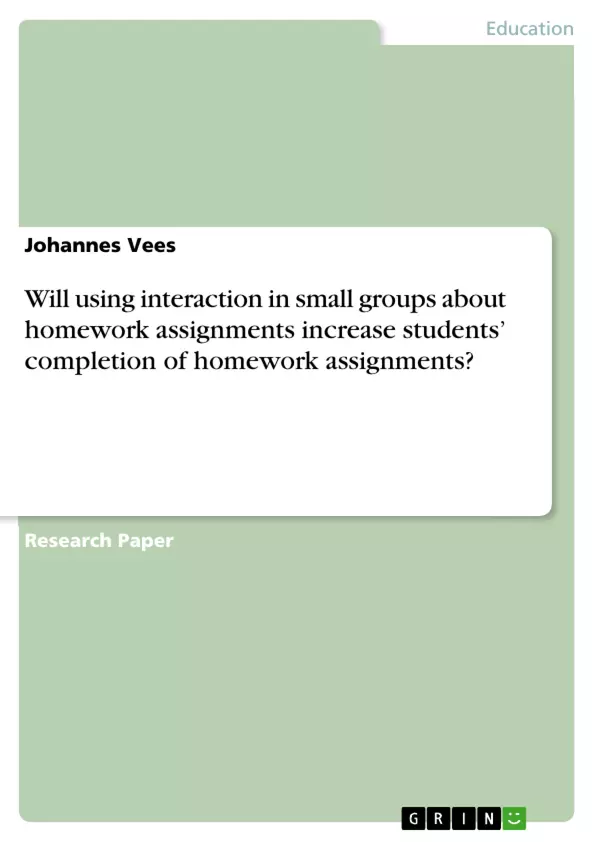This paper is part of an observation as a clinical experience requirement of the course listed on the title page. It takes place at a High School in a 10th grade history class under Mr.E.’s leadership. The class, which I attend twice a week for one period, consists of 16 students (eight of them are male, eight female). As far as I’m concerned, I am a German exchange student spending one semester at Samford University with the main objective of improving my English since I’m going to be a secondary school teacher back in Germany. English is – alongside with German and Physical Education – one of the subjects that I’m going to teach. This semester is my fourth one, so I would be pretty much a sophomore in the American Educational System. However, the German Educational System works quite differently which is the reason for still having approximately four years of study to complete.
Before being able to start an action research, the researcher has to identify a research question. It is raised the question which matters could be of interest. After having led a conversation with my mentor about an interesting field of investigation, we came to the conclusion that the completion of homework was an important concern. He told me about his difficulties in coping with this problem in 10th grade in history. He was willing to figure out a solution to the apparently big problem. Since some students don’t do any homework at all regularly, it is definitely a problem worth taking into focus. There are multiple ways to deal with unsatisfactory homework behavior of students. Punishment in form of extra work is probably one of the most common means to encounter it. Yet, multiple generations of teachers have already applied this measure, but the problem has, quite obviously, not vanished. Therefore, this method doesn’t seem to work appropriately. This is, in my opinion, due to the fact that students are only extrinsically motivated in this case. Another example of extrinsic motivation is rewarding. Yet it may be helpful in some cases, it is still a means of extrinsic motivation and therefore not last perpetual wisdom. Extrinsic motivation is not a long-ranging solution to the problem. There are other options to take.
Inhaltsverzeichnis (Table of Contents)
- Completion of homework
- Introduction
- Research Question
- Problem Relevance
- Definitions
- Review of Literature
- Hypotheses
- Outcome Measures
- Methods Design
- Data Collection
- Schedule
- Data Analysis
- Baseline Data
- Post-intervention Data
- Report of Findings
- Interpretation
- Practice Decisions
- Bibliography
- Internet sources
Zielsetzung und Themenschwerpunkte (Objectives and Key Themes)
This action research project aims to investigate the potential impact of small group interaction on homework completion rates in a 10th-grade history class. The goal is to determine whether this strategy can effectively increase student engagement and improve homework completion rates.
- The importance of homework in promoting learning and academic achievement.
- The role of intrinsic motivation in student engagement and homework completion.
- The potential of small group interaction as a strategy for improving homework completion rates.
- The challenges and strategies for addressing homework completion issues in a high school setting.
- The significance of student feedback in shaping teaching practices and improving learning outcomes.
Zusammenfassung der Kapitel (Chapter Summaries)
The introduction provides context for the action research project, outlining the setting and participants. Chapter 1 delves into the research question, discussing the motivation behind the study and the importance of addressing homework completion concerns. Chapter 2 explores the relevance of homework, examining its benefits and the factors that contribute to students' reluctance to complete assignments. Chapter 3 defines the key terms used in the study, including homework and its different types.
Schlüsselwörter (Keywords)
The key terms and concepts explored in this action research project include: homework, intrinsic motivation, small group interaction, student engagement, homework completion rates, action research, and high school education.
Frequently Asked Questions
Can small group interaction improve homework completion?
This action research project investigates whether allowing students to discuss and work on assignments in small groups increases their engagement and completion rates.
What is the role of intrinsic motivation in homework?
The study argues that punishment (extrinsic) often fails, and fostering social interaction can increase intrinsic motivation, leading to better long-term results.
Why is homework completion a major concern in high schools?
Regularly missing homework hinders academic achievement and makes it difficult for teachers to follow the curriculum effectively.
What is action research in an educational setting?
It is a methodology where teachers identify a problem in their own classroom, implement a specific intervention, and analyze the data to improve teaching practices.
How does the German educational system differ from the American one?
The author notes that German teacher training is longer and structured differently, requiring several years of study even after reaching a status similar to a US sophomore.
- Quote paper
- Johannes Vees (Author), 2007, Will using interaction in small groups about homework assignments increase students’ completion of homework assignments?, Munich, GRIN Verlag, https://www.grin.com/document/139855



